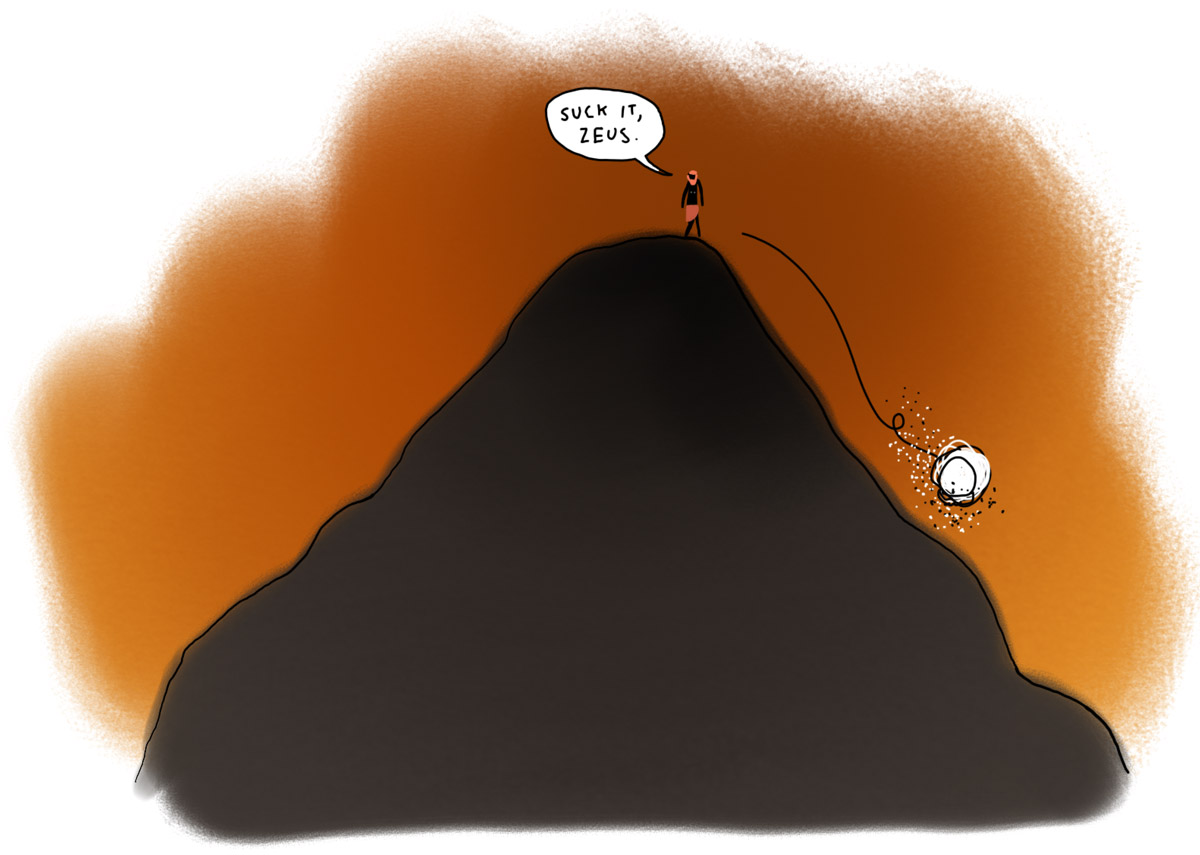Goals + Habits
TL;DR: Goals often fall flat. Choosing good habits—and practicing them—can change that.
I like to know where I’m going. So, I document my goals, and reassess them weekly. Like you, I don’t achieve most of them. For a while, this led me to believe that goals were pointless. Since then, I’ve worked on this more. I’ve also helped others do the same. Here’s what I’ve noticed.
Goals are difficult
There’s little wrong with goals. It’s useful to have a destination in mind. That said, goals often fail. Some fail because they’re not yours. You might have read a famous business owner’s biography, and “borrowed” their goals. Most times, this doesn’t work out very well.
Other goals fail because they’re unsupported. This is like saying you’d like to be a comedian, and then not make the time to write any jokes. Without a plan for how you might achieve your goals, they remain a fantasy. (This “how” part is what I most often see as the missing piece, when people set goals.)
Without determining why and how you intend to achieve something, it won’t happen. You’ll start strong, wane within a few days, and soon find yourself dealing with other matters.
Know your why
Most of us seek out examples to follow. This doesn’t work with goals, though. Nope. You’ll soon tire of living like someone else. Your goals—and reasons for them—should be yours alone.
I wish I could help you choose from all the possible goals. It doesn’t work like that, though. The only bit of advice I can share on choosing between goals, is to reflect on what fulfills you now. Odds are, that same act will fulfill you later, too. Conversely, something you haven’t experienced (like being rich) might not turn out to be what it seems.
Your ego can work against you, when setting a goal. It seeks external reinforcement, instead of internal fulfillment. In my experience, this always turns out to be a dead end. Make your goal personal and simple—otherwise, you’ll lose sight of it.
Determine what’s essential
Choosing a destination, and mapping a course to it are two different tasks. Some select a destination, and hope they’ll magically arrive at it.1 These people leap from one set of goals, to the next, wondering why they are so unlucky.
The question you need to ask, is: What’s essential to making my goal happen? The answer should be pretty simple. For example, if you want to be a comedian, you probably need to write jokes. If you want to be a designer, you probably need to design things. If you want to be rich, you probably need to build something that produces revenue.
This seems obvious—and it is. This doesn’t make it any easier, though. I’ve met countless “aspiring entrepreneurs” who read business books, go to networking events, and follow all the new startups. But, these same people never seem to ship.
For this reason, you might want to create a list of tasks that don’t matter, or things you don’t do. Identifying low-yield tasks can help you avoid them.
Practice habits
Now, you have a destination, and a plan for getting there. The next part requires you to get in the car and drive. This part, too, can be difficult.
Some days you won’t feel like driving. Or, you’ll wonder whether you’re getting anywhere. “This’ll never work.” “I should have done something else.” “There must be a faster way.” Give these thoughts your ear, and they’ll paralyze you. Use habits to silence nagging doubts.
Let’s use that aspiring comedian as an example. When in doubt, all she needs to do, is keep writing jokes. She can use this as a mantra. When doubt says, “you should quit”, she blocks with: “keep writing jokes”.
Habits are challenging to form, but get stronger with practice. In time, autopilot takes over. You don’t need to think about practicing them, you just do what you did the day before.
Big ones
One last consideration. Big goals are fine. That said, you should recognize them for what they are. The bigger the goal, the harder it’ll be to achieve. For these, you can either choose smaller ones, or give yourself more time.
Whatever your goals, don’t be too hard on yourself. Goals sometimes change. Habits aren’t easily formed. If you find yourself gone astray, pause for a moment. Remind yourself what you want to achieve, and why. Return to that habit, and start where you left off. Pay your slip no further attention. Everyone has those.
Homework
Fill in the blanks: I want to _____________, because _____________. I’ll make this happen by _____________, every day.
—
- Consider the phrase, “If you can dream it, you can do it.” While the sentiment is inspiring, I suspect it’s often misread as, “If you imagine it, it will happen on its own.” Remember: the doing part is as important as the dreaming part.
I’m @karj and the above is just my opinion. Looking for more? Here’s a full list of articles and information on my books. This is what I’m doing now, and what I don’t do. I’d love it if you tried Emetti on your website!